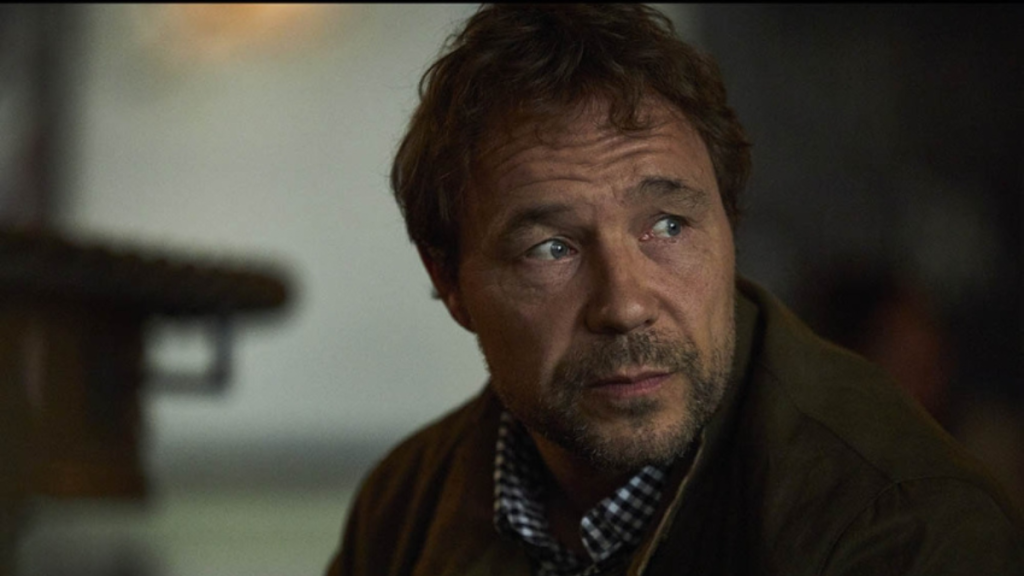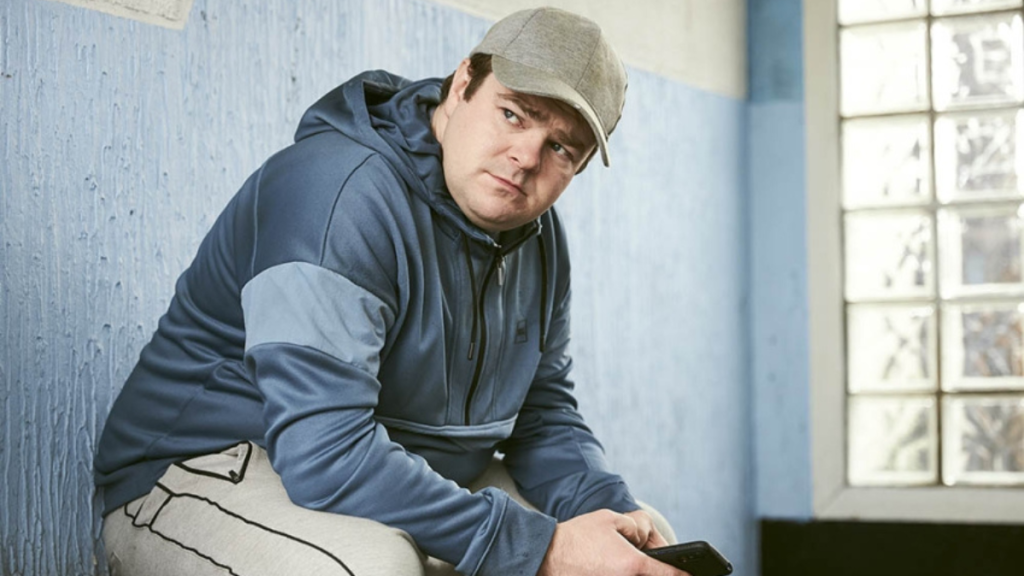This review contains SPOILERS for all five episodes of The Walk-In
Any drama that has a first episode including the line ‘Where Hitler went wrong is he showed mercy’ is going to be a difficult watch, and ITV’s true-crime offering The Walk-In certainly goes in hard from the off. Its very first scene depicts a brutal 2015 terrorist attack – white nationalist Zack Davies storms into a Welsh supermarket to attack dentist Dr Sarandev Bhambra with a machete while screaming ‘white power’ – effectively establishing how unflinchingly this series will deal with its central theme.
Screenwriter Jeff Pope’s latest drama tells the true story of how – as part of his work with advocacy group Hope Not Hate – Matthew Collins (played by Line of Duty and This Is England‘s Stephen Graham) infiltrated UK far-right terrorist groups in order to stop a plot to murder a second MP following the attack on Jo Cox in June 2016.
The series is especially jarring in how it says the quiet part out loud; these days, we’re so used to hearing right-wing commentators in the media slyly blowing their racist dog whistles while maintaining a paper-thin facade of respectability, but The Walk-In immediately and repeatedly shows the raw, ugly truth of racism in the UK, via several characters’ violent, baseless hatred of minorities, and repulsive belief in white supremacy. The depiction of Jo Cox’s tragic death at the end of episode one is a sickening reminder of where this rhetoric can and does lead, compounded by the inclusion of real-life footage throughout the series including the Brexit campaign, Cox’s funeral, and her poignant maiden speech in Parliament.
Stephen Graham is at his convincing, multi-layered best as activist Matthew Collins. In his first appearance, he elicits a gasp from the crowd he’s addressing when he makes the shocking revelation that he was formerly an active and key player in neo-Nazi groups himself. And Collins’ past haunts him throughout the series, quite literally at times (we learn he constantly has to uproot his family to a new home when past acquaintances discover his address) but also through a series of flashbacks, where the hate-filled young version of Stephen Graham’s Collins is uncannily played by Sam Baker-Jones (Noughts and Crosses).

Pope is keen to hammer home that Collins is not just the two-dimensional reformed hero he first appears. As Graham expertly shows, he’s a man who doesn’t know where to draw the line on his mission to stamp out far-right terrorism, and the extreme lengths he goes to often put his own family at serious risk, all in an ultimately doomed attempt to erase the guilt at his own violent and unpalatable past.
The series’ other protagonist Robbie Mullen (This is England’s Andrew Ellis) is at first a somewhat superficial figure; an impressionable, disaffected scruff who almost unwittingly bumbles his way into becoming a key figure in one of the UK’s most vicious far-right groups, National Action.
But at his initiation into the group, we see he’s their prime target, someone they can easily brainwash to ‘shed your skin’ and ‘become a completely different person’, making him commit to leaving his family and past life behind. What saves Robbie Mullen is that this is one order he doesn’t follow, and through all the foul slurs, flag-burning and sieg-heiling, he doesn’t manage to switch his humanity off completely.
That’s what brings him and Collins together: in a less-than shocking reveal, we find out that the anonymous informant who’s been emailing Hope Not Hate about National Action’s plot to kill MP Rosie Cooper is, of course, Robbie.
In an action movie version of this story, it would probably end as soon as the bad guys’ deadly plot is foiled, but this true-crime depiction shows the reality of justice isn’t always this exciting. When murderous wannabe Jack Renshaw (Game of Thrones’ Dean-Charles Chapman) is caught – a man who glorifies violence in his speeches and is also responsible for the aforementioned Hitler line – he doesn’t go out in a blaze of glory, but is caught hiding in a cupboard.

The power of this series is it goes beyond neutralising the threat, and deals with the real-life consequences: the bureaucracy of bringing such heinous crimes to justice, the long wait for a trial, the anxiety about testifying. Is it a thrilling, action-packed series? Frankly, no. But neither is doing the right thing, most of the time. And the people doing the right thing don’t have to be likeable, either.
Indeed, Pope cleverly twists the knife every time the audience begins to feel sympathy for Robbie as he camps out at the Collins family home awaiting the trial, repeatedly shocking us with a reminder that without Renshaw’s murder plot, Robbie would probably still be part of National Action. One minute he’s playing video games with Collins’ children or pitifully admitting ‘I’ve never had friends’, the next he’s railing against minorities or complaining that an East London borough is like ‘the middle of fucking Nigeria’. Robbie is no hero.
Instead of bloody violence, Pope uses understated realism to unsettle the audience, keeping us gripped as the threat of imminent consequences for fighting fascism underpins every second of the Collins family’s daily life. Matthew’s long-suffering wife Alison (played with grit and charm by Cold Feet’s Leanne Best) stands folding laundry while discussing having to pull the kids out of school after police report a ‘credible threat’. She playfully teases the boys as they leave home to visit their grandma, while Matthew checks under their car for bombs.
The wider cast is a recognisable, talented ensemble, especially Chris Coghill (Eastenders), who plays National Action leader Lythgoe with simmering, intense rage. His face is so emotive that we sometimes see hints of almost childish vulnerability as he struggles to comprehend living in a world where almost no-one outside his National Action dominion agrees with his abhorrent views. It’s not sympathy we’re made to feel, though – Lythgoe and his ilk are truly irredeemable – but Pope importantly shows us Lythgoe is not just a monster, he’s human, and that’s far more terrifying.
A quick glance at Twitter during the broadcast makes it obvious why a drama like this is so necessary today – among vast praise for the series, there’s plenty of comments that would frankly be more at home in a National Action meeting. While there is hope, there is also still hate, and that’s a reality that – like Jeff Pope’s The Walk-In – we mustn’t shy away from.
The Walk-In airs on Mondays at 9pm on ITV and is currently available to stream in full on ITV Hub.
